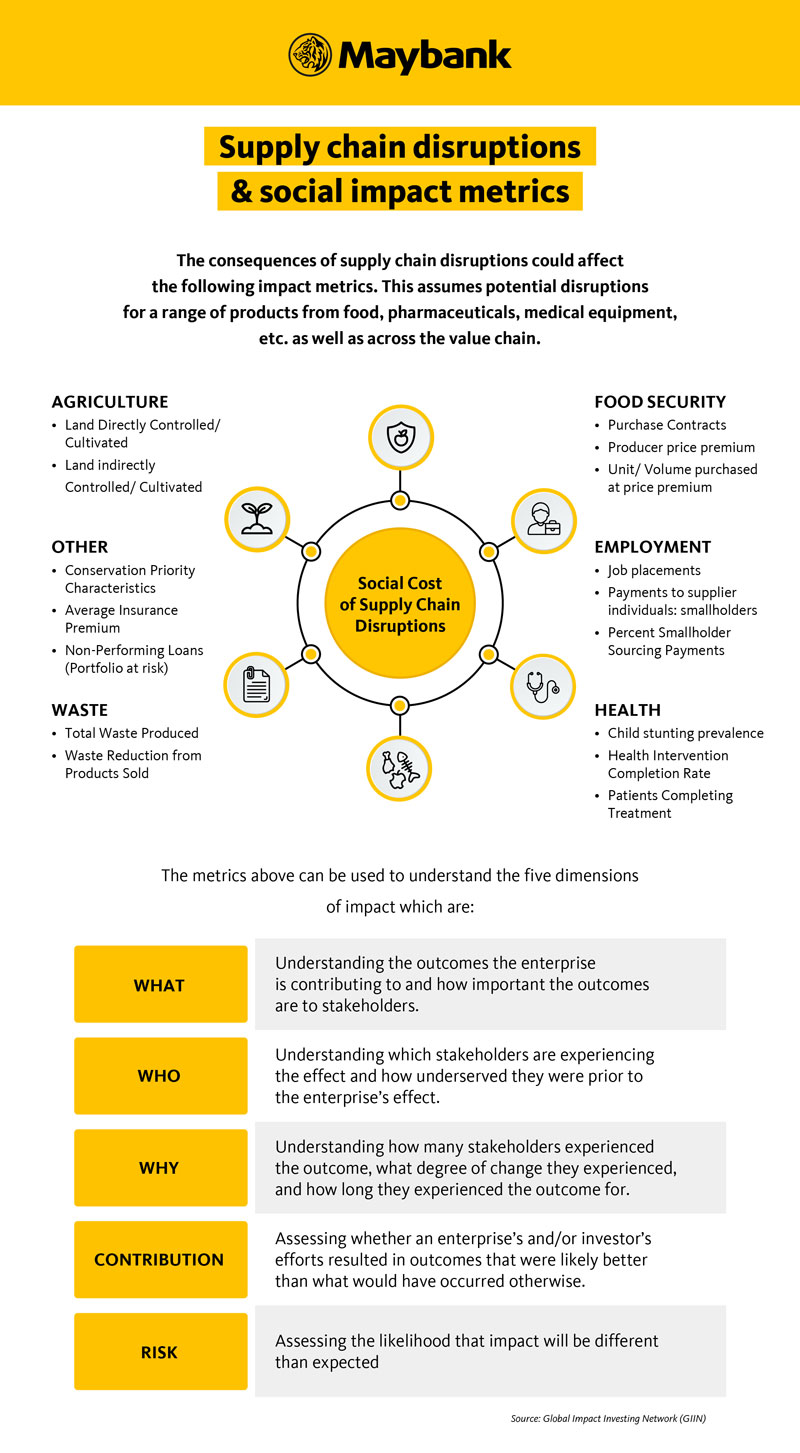Supply chains across the world have been pushed to the brink over the last two years, revealing the shortcomings and inequalities behind a highly complex environment. Continued disruptions will exact not only heavy economic costs, but also carry social implications. Maybank can help businesses anticipate these risks and take immediate action to protect their most vulnerable workers.
Globally, working hours have reduced by 4.3 percent below pre-pandemic levels in 2021, which is equivalent to the loss of 125 million full-time jobs¹. Women in particular have been disproportionately impacted by job losses and reduced hours during the pandemic. Meanwhile, more than 150 million people were pushed to the brink of starvation due to disruptions in food supply².
All this paints a troubling situation for workers in global supply chains. Due to the impacts of COVID-19 in terms of physical and mental health, finances, and even gender-based violence, it is likely that decades of past gains in poverty reduction and gender equality globally are now at risk. If these gains are reversed, the consequences on broader societal well-being and long-term prospects would be detrimental.
Whenever there is a breakdown in the flow of goods - consumers, workers, businesses, and societies all will have to pay a price. Business leaders must therefore make rapid decisions and take immediate actions to protect and support their vulnerable workers, which in turn will help sustain business operations to better serve their customers, clients, as well as communities on the road to shared recovery.
Understanding the social costs of disruption
Businesses have already seen tremendous losses across their operations due to supply chain disruptions from COVID-19. In fact, 94% of Fortune 100 companies have experienced disruptions, with 55% of companies downgrading their outlooks for growth³. This is because many of their suppliers like factories and farms equally experienced financial distress from cancelled orders and delayed payments.
As a result, workers in some developing countries have lower incomes, forcing them to reduce or skip meals because they do not have enough money to pay for food. In Bangladesh, 54% of male and 40% of female workers were cutting down on food due to reduced salaries. In Kenya, where the situation is most dramatic, 70% of female and 78% of male workers had to skip or cut the size of their meals4.
With reduced or no income, more workers are also forced to rely on loans to make ends meet. Across many ASEAN countries, workers are using loans to cover even basic needs such as paying rent or buying groceries. In Vietnam, loans increased by 4% among female workers and by 17% among male workers. In some countries, workers might be taking fewer loans but are instead relying on their personal savings.
Beyond financial pressures, anxiety and strains on mental health have also increased for workers throughout supply chains. Worryingly, recent studies point to a spike in cases of mental illness and an increase in the risk of suicide. Experts believe that persistent disruptions could lead to unmanageable public levels of chronic stress, depression, alcohol dependence, and self-harm.
Moreover, greater economic and emotional strains caused by disruptions have led to an increase in domestic arguments and gender-based violence, as perpetrators seek to maintain a sense of power and control in their lives. Surveys indicate that between 15% and 68% of women across ASEAN have experienced physical or sexual violence at the hands of an intimate partner5.
Looking further ahead, the pandemic has also accelerated broader trends such as supply chain consolidation and automation, which will only hasten the decline of traditional jobs. Having experienced first-hand the economic impact of COVID-19 disruptions, businesses now have a responsibility to ensure their supply chain workers continue to be a fundamental part of their growth and recovery plans.
Building resiliency and responsibility into supply chains
Since supply chains can be highly complex and vary greatly across products or industries, there is no standard metric for measuring the social cost of disruptions. Nonetheless, they can be partially accessed and quantified using impact metrics and full cost accounting. Understanding how to effectively measure and manage supply chain impact is important to ensure businesses are achieving their desired results.
For instance, impact metrics from the free, publicly available resource, IRIS+ managed by the Global Impact Investing Network (GIIN) could be deployed by businesses to investigate and determine which social aspects of their supply chains would be negatively affected by disruptions6. These includes metrics within the dimensions of health, employment, food security, and others.

Beyond metrics alone, hearing directly from workers about their needs is fundamental for understanding the social cost of disruptions. Businesses could collect and use gender-disaggregated data to increase understanding of the needs of workers in their supply chains and develop actionable solutions. This could include a risk assessment specifically looking at the different impacts on women and men workers.
Of course, businesses cannot make improvements in isolation and must engage with other stakeholders to support coordinated responses to worker issues such as hunger, mental health, and gender-based violence. While schemes can take different forms, cash transfers and access to unemployment benefits would offer critical lifelines when income is reduced or uncertain.
Businesses can also rely on suppliers to commit to, and implement, programs supporting women and other vulnerable workers. Donors can play a vital role in filling the funding gap where companies struggle to have adequate resources for providing support. Outside the workplace, partnerships with governments and civil society are also key for ensuring workers' full access to social protection schemes.
As much as supply chain disruptions have a social cost, resiliency and responsibility have a social benefit in terms of maximising the consumption of essential goods and boosting the economy's capacity to withstand future disruptions. By stimulating the adoption of both elements for supply chains of the future, businesses can minimise the social costs from disruption while unlocking the social benefits.
Futureproofing supply chains with the right partner
The economic turmoil caused by the disruptions in COVID-19's aftermath has exposed many vulnerabilities in global supply chains. Instead of backing away from globalisation, businesses should use this crisis to take a fresh look at their supply networks and confidently execute a long-term plan to mitigate the financial, health, and social risks to their most vulnerable workers.
While the current landscape presents a tough environment, Maybank believes that investing in people and communities will always reap long-term returns. As an organisation, we strive to deliver gender diversity and inclusion for our people, while we work towards advancing inclusivity beyond the bank7. Backed by our strong expertise in sustainability, we are well-positioned to help businesses take the right actions for improving the lives and livelihoods of workers, build-back resilience, and protect the functioning of next-generation supply chains.
To learn more about how Maybank can help your business build resilient and responsible supply chains, please reach out and connect with our team.
1International Labour Organization, "Employment impact of the pandemic worse than expected", 27 Oct 2021
2The World Bank, "COVID-19 to Add as Many as 150 Million Extreme Poor by 2021", 7 Oct 2020
3Fortune, "94% of the Fortune 1000 are seeing coronavirus supply chain disruptions: Report", 22 Feb 2020
4BSR, "Understanding the Human Cost of the COVID-19 Pandemic for Workers in the Supply Chain," 9 Dec 2020
5UNFPA, "Measuring prevalence of violence against women in Asia-Pacific"
6IRIS+, Global Impact Investing Network (GIIN)
7Human Resources Online, How Maybank is driving greater diversity on the leadership bench

 Linkedin
Linkedin Facebook
Facebook Email
Email Whatsapp
Whatsapp Telegram
Telegram
